The New Orleans doctor who helped stop the bleeding. Read more
A Remarkable Life Remembered: Dr. Norman McSwain, 1937-2015
We are very saddened to report that Dr. Norman McSwain passed away on July 28 in his home in New Orleans. Internationally renowned and respected for his pioneering work in trauma care, Dr. McSwain founded NAEMT’s Prehospital Trauma Life Support (PHTLS) program 30 years ago, and is recognized by our association as the father of NAEMT education.
In addition to his prestigious career as a trauma surgeon, Dr. McSwain was a certified paramedic. He worked tirelessly throughout his career to ensure that EMS practitioners, both in the civilian and military sectors, received the highest quality education to enable them to provide the best care to their patients. He understood the important role of paramedicine in improving patient survivability in a trauma incident, and made it part of his life’s mission to provide all EMS practitioners with the knowledge and skills needed to make good decisions in the field for their patients. He is admired and beloved by the EMS community across our country, as well as around the world, for his vision and passion for excellence in patient care.
He will be missed by the thousands of people whose lives he touched, but he will live on in the hearts and minds of his family, friends, colleagues, students and patients.
Donations can be made to the Norman E. McSwain, Jr., MD, FACS, Endowed Trauma Fund, c/o Tulane University School of Medicine, Department of Surgery, 1430 Tulane Avenue SL-22, New Orleans, LA, and/or to CaringBridge.com.
"When he greets you he will say, 'What have you done for the good of mankind today?' And he meant it and he lived it himself." — Dr. Lance Stuke
"When Norman would call, he often began the conversation with 'What have you done for the good of mankind lately?' Norman was a giant in the field of trauma surgery, an international leader in prehospital trauma care for both the civilian and military sectors, and a world-class friend. When Norman arrived at the pearly gates today and St. Peter asked him 'What have you done for the good of mankind?,' I am positive that both St. Peter – and his Boss – were very well pleased with Norm's answer. Rest in peace to a truly wonderful person." — Dr. Frank Butler
"What have you done today for the good of mankind?" This is how Norman would always begin a phone conversation. Well, no one has done more for the good of mankind than Norman McSwain. In his loved profession of being a trauma surgeon, he has touched and saved so many lives. In his role as the founder and medical director of PHTLS, he has contributed more to the education of prehospital providers and the survival of trauma patients around the world than anyone else I can think of. On a personal level, he has been a friend, teacher and mentor... a truly great physician and human being." — Dr. Peter Pons
"Dr. McSwain always treated me with respect and as a peer. He was always kind, to the point, and was not afraid to work hard for the good of the masses, regardless of who got the credit. He was always ready to grab a medic or a student and have them work along with him, helping them achieve their goals along the way. He always asked us out to dinner when meeting at a conference or workshop and when running into you, would ask "What have you done for mankind today?" Without Norman and his hard work, EMS today would not exist as we know it. And he always, always supported our troops. Godspeed, Dr. McSwain. Well done." — Retired Army Lt. Col. Ben Chlapek
"Dr. Norman McSwain was a pioneer in emergency trauma care and in EMS. Not only did his work impact the EMS service in New Orleans, his techniques and training were adopted by other agencies across the nation, including Acadian Ambulance, improving trauma care for hundreds of thousands of patients. He had a great deal of passion for patient care, saving lives, and bringing parties together to make sure that trauma patients were receiving the right care to maximize their chance of survival. We will always be grateful for his interest and involvement in improving patient care both in the pre-hospital field and the hospital ER." — Richard E. Zuschlag, Chairman & CEO, Acadian Ambulance Service, Inc.
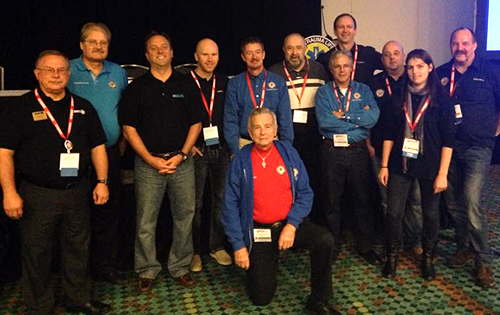
"With the death of Dr. McSwain, the American College of Surgeons Committee on Trauma loses its most senior active member. Dr. McSwain’s dynamic, positive, warm, friendly and uplifting approach to getting things done through the work of the COT is a loss for surgeons and patients everywhere. In his 40-year tenure with the COT, Dr. McSwain touched, influenced or led all the Committee achieved over this critical period of time.
In 1973, Dr. McSwain was inducted as a Fellow of the American College of Surgeons. He began his involvement with the COT in 1975 through his work with the Kansas Committee on Trauma. Four years later he was appointed to the National COT where he led both the Pre-hospital Care Committee and the ATLS Committee. He was an important member of the surgical team who revised the initial Hospital Resources Document, which became the ACS COT Verification program. Over the next three decades Dr. McSwain led the Louisiana Committee on Trauma, served on the task force for Operative Skills, was a liaison to the Board of Regents and most recently served as the liaison for the National Association of Emergency Medical Technicians (NAEMT).
From the beginning to the end of his surgical career, Dr. McSwain transformed the care of the patient throughout all phases of injury care. The phrase he personally used to describe his approach, repeatedly iterated in his 2003 Scudder Oration, was: Trauma is a surgical disease from beginning to end. This led him down a path where, without a doubt, he became the most important surgical advocate for great pre-hospital patient care. In 1975, Dr. McSwain was a founder of the National Association of Emergency Medical Technicians (NAEMT), which developed the Pre-Hospital Trauma Life Support Course (PHTLS). He championed PHTLS and the NAEMT until he could physically do so no more, just two weeks ago. Over a million students have been taught PHTLS. This work transformed, enhanced and improved the care of the injured patient when they needed it the most. This work, more than any other, set the stage for the modern version of Tactical Combat Casualty Care. His work in pre-hospital care of trauma patients has inspired generations of EMS professionals and saved millions of lives.
Dr. Norman McSwain received every honor the American College of Surgeons Committee on Trauma can bestow. In 2003 Dr. McSwain presented the Scudder Oration, “Prehospital Care from Napoleon to Mars: The Surgeons Role.” From NAEMT, he received the award that now bears his name, “Dr. Norman E. McSwain Jr. PHTLS Leadership Award.”
Dr. McSwain embodied the words he spoke in his Scudder Oration; Trauma is surgical disease from beginning to end. And, from beginning to end, Dr. Norman E. McSwain, Jr. made a palpable and dramatic difference in the care of trauma patients when they needed it the most. Let us celebrate Norm’s life with the joy and passion he brought to us. Let us honor Dr. McSwain by continuing his life’s work with the same zeal, commitment and love he brought to the Profession. There can be no finer, nor more fitting, tribute than to begin and end each day asking ourselves, in words Norman spoke to us all the time, "What have you done for the good of mankind today?" — Ronald M. Stewart, MD, FACS, Chair of the ACS Committee on Trauma; and Michael F. Rotondo, MD, FACS, Medical Director, ACS Trauma Program
"University Medical Center New Orleans is grieving the loss of a beloved member of our family, a medical trailblazer and a hero to many. Dr. Norman McSwain saved countless lives, trained thousands of physicians and inspired an immeasurable number of colleagues, friends and patients. Our thoughts and prayers are with his family and friends during this difficult time. As we mourn the loss of this medical giant, we continue to be amazed by the revolutionary impact he made on our hospital and the industry. Dr. McSwain’s talents made him highly sought after, but he chose to stay in and care for the city of New Orleans. His decades of leadership have forever changed our community for the better. Though our hearts will be heavy as we open the doors to UMC New Orleans on August 1, we are deeply honored that Dr. McSwain was such an integral part of our organization. We will forever feel blessed to have called him our mentor and our friend." — University Medical Center New Orleans and LCMC Health
Dr. McSwain's tireless efforts and dedication to prehospital trauma care will not be forgotten.
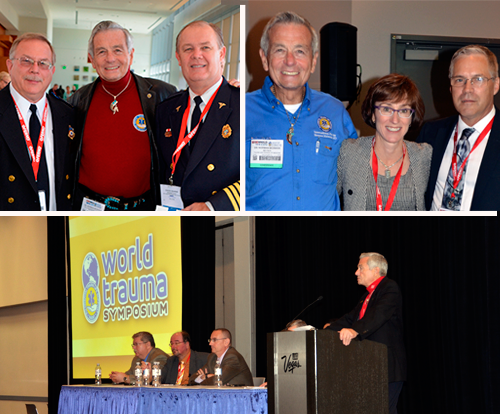
"I first met Dr. McSwain in 1979 at the annual conference of the Montana EMS Association. He was the keynote presenter. His talk was inspirational. At the same conference I presented a session on “Hypothermia: The EMTs Dilemma.” Norman approached me after the talk and said that I should submit it to the EMT Journal. It was published in 1981 and never would have been submitted without Dr. McSwain’s encouragement.
In the early 1980’s the Montana EMS Association (Rahm, N., Hansen, J.D., Sanddal, N.D.) began work on “Critical Care for the Basic EMT (CTC)” at roughly the same time as PHTLS began to evolve. There was a good deal of “cross fertilization” between the two courses and Norman was always generous in sharing his ideas and concept while acknowledging, at that time, PHTLS was directed solely towards ALS providers, which left those of us who were EMTs working rural environments without a solid training program for trauma care. When PHTLS began to include information for EMTs several years later, CTC stopped being promoted in favor of PHTLS.
In the mid 1980’s I had the privilege of working with Norman as a Co-PI in revising the NHTSA National Standard Curriculum for EMT-B, EMT-I and EMT-P (1985 ancient nomenclature). We had our arguments, Dr. McSwain had very strong opinions about the area of prehospital care in general, and about prehospital trauma care, in particular. He was a consummate leader, mentor and gentlemen… after 8-10 hours of disagreement he was always willing to set aside his personal biases and engage in pleasant dinner conversations. It was obvious that he held prehospital care providers in high regard, and essential to care of the injured patient.
I was very honored to have had Dr. McSwain present the 1985 Jeffery S. Harris Award to me for the CTC course. Dr. McSwain and I had many additional contacts over the years, most recently concerning the joint release and distribution of the bleeding control (B-Con) training program to key surgeons across the U.S. while ensuring that contact between NAEMT’s PHTLS assets were engaged and involved. After all of those years, he always did start a greeting with “What have you done for mankind today”… an inspirational challenge." — Nels D. Sanddal, PhD, MS, CEMSO, REMT, Manager, Trauma Systems Consultation and Trauma Center Verification Program, American College of Surgeons
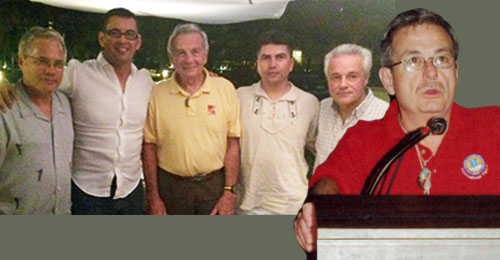
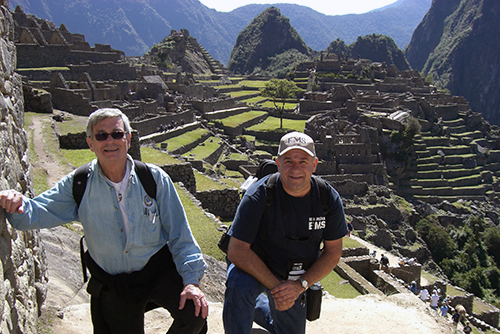
"Dr. McSwain was Chairman of the Board of Directors of the NREMT when I was selected as its second Executive Director. He was a dear friend. I first met Norman at the first NAEMT conference at Kent State University in 1978 and when I asked him years later of the occasion he immediately replied we had first met at NAEMTs first conference. In the early days of EMS our career field needed leaders like Norman. A clinician, a physician, a trauma surgeon, already respected by his colleagues, who led and sacrificed many personal hours of contributions to a young industry. We all know about Dr. McSwain’s leadership in PHTLS but it reached beyond that to the early days of Paramedic Accreditation, the NREMT and into many avenues across this nation as he spoke and taught about trauma care and EMS contributions. There will never be another Norman McSwain and I am grateful to have worked with him, to know him, to smile with him, and to be a part of his life. May his memory be eternal in the lives of all EMS providers. His contributions will be equaled by few." — Bill Brown, retired Executive Director of the NREMT
"We've lost another great one - a pioneer of EMS and modern trauma care. Dr. Norman McSwain did so much good for this world with his keen mind, skilled hands, and humble heart. I had the privilege of being one of his thousands of students when I became certified in one of the first PreHospital Trauma Life Support (PHTLS) Instructor Courses in the mid-1980s in Orlando, Florida. What a great man. RIP, Dr. McSwain, you will be missed by so many, and you leave an amazing legacy in all the training programs you developed, refined, and taught to legions of EMS providers around the world." — Steve Wirth
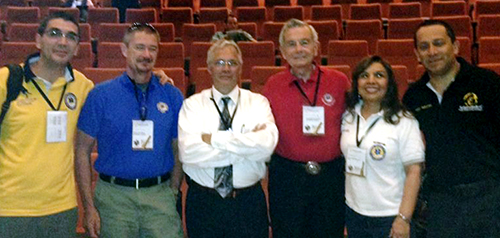
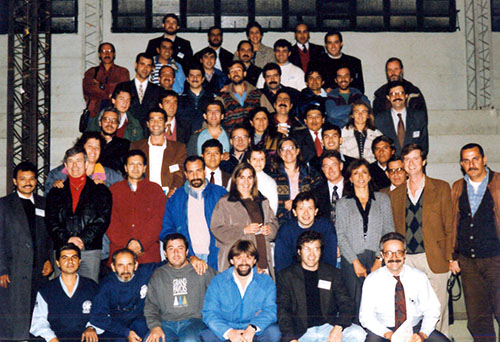
Remembering Trauma Surgeon Dr. Norman McSwain
“His commitment to improving the care of the injured patient saved countless lives and improved the quality of life of untold millions of people." — Dr. Douglas P. Slakey, Professor & Chair, Tulane Department of Surgery
Internationally renowned trauma surgeon Dr. Norman McSwain who helped transform the way doctors and first responders treat the most severely injured, leaves an “unparalleled” legacy at Tulane and beyond, according to friends and co-workers.
McSwain, 78, died Tuesday (July 28) at his French Quarter home after a brief hospitalization for a cerebral bleed earlier this month.
“Dr. McSwain was a beloved, committed and devoted surgeon who has left an unparalleled legacy, not only in New Orleans, but also around the world,” said Dr. Lee Hamm, Dean of Tulane University School of Medicine.
McSwain joined the Tulane University faculty in 1977, but it was his dedication and commitment as a practicing trauma surgeon that gained him national accolades. He served as trauma director and a member of the teaching staff of Charity Hospital of New Orleans, surgeon for the New Orleans Police Department since 1979, and medical director of New Orleans’ Emergency Medical Services Division. Shortly after his arrival in New Orleans in 1978, the city tapped McSwain to develop an EMS system here.
McSwain viewed improving trauma surgical care as a global public health initiative, working with healthcare organizations and governments around the world to develop and improve systems for effectively caring for injured patients. In New Orleans, he worked tirelessly to ensure that the missions of clinical care education and research were at the highest levels and consistently applied and delivered to all people regardless of their personal circumstances, said Dr. Douglas Slakey, who holds the Robert and Viola Lobrano Chair of Surgery at Tulane.
“He was of a generation who largely put their self interest secondary to the mission of being a physician,” Slakey said. “He felt that the privilege of being a physician and caring for patients was of the highest calling and far more important than personal gain. He was the sort of person who would tell people that if you do what you love, success — however you measure it — will follow.”
McSwain’s commitment to the Charity trauma system transcended local politics, as he viewed service to the community as his highest responsibility.
“His focus was clearly on providing the highest quality of care and passing on his experience and knowledge in the form of education and training to not only physicians and medical students but also every level of health care provider,” Slakey said. “He truly thought that the team was more important than the individual.”
Honored in 2009 with the Senior Vice President's Teaching Scholar Award, McSwain was known for sharing his 18 "Rules of Patient Care" with medical students and colleagues. The document is signed with "Tsa-La-Gi," Cherokee for "medicine man," reflecting his affinity for Native American cultures.
McSwain relocated to New Orleans because he considered Charity Hospital to be one of the nation’s most important trauma centers. But his efforts resonated worldwide: His work with the American College of Surgeons Committee on Trauma and National Association of EMTs resulted in a Pre-Hospital Trauma Life Support program that is a global standard for trauma care. That program has trained more than 500,000 people in 45 countries.
McSwain wrote numerous textbooks and articles and received many awards for his trauma work. He is the only person in the history of the American College of Surgeons to receive all five of its major trauma awards.
Dr. Peter Meade, who holds the William Henderson Chair in Surgery at Tulane, remembered McSwain as the surgeon everyone wanted to emulate. Despite his legendary status as a doctor, he was approachable and generous.
“The great ones don’t have to act great. There was a tremendous amount of love for this man — at all levels of the hospital,” Meade said. “You just don’t meet a lot of people like that. He meant a lot to us. He was Tulane.”
— Douglas P. Slakey, MD, MPH, Robert and Viola Lobrano Chair of Surgery, Tulane University
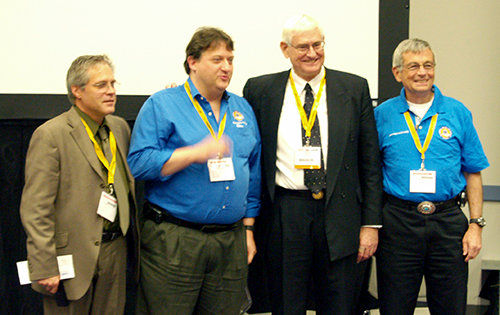
"This picture was taken during the 25th anniversary of PHTLS, must have been in 2011 at Las Vegas. Norman was kind enough to meet with me around 2004 when we first considered taking PHTLS to Germany. We met at different EMS Expo’s in the following years, and I had the honor and pleasure to teach on his faculty in some preconference classes in the following years. He showed me – in class and even more in the practical finals – what is meant by “principal – not procedure,” something we as a bit Prussian Germans had a hard time to understand every now and then. With almost 25 years in EMS and EMS education I’ve met not a single other leader who made following his example so easy – and so hard as far as his enormous footprints are concerned. We have lost one of the really great ones." — Michael Bernhardt, Notfallsanitäter and EMS Educator, Member of the founding board of PHTLS Germany in 2009